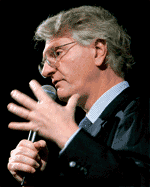By Chris Garnett
 |
“In emerging markets I find astonishing the prices some of our competitors have been prepared to pay. Even if we had 10 years of the most favourable cycle you can imagine, you’d still struggle to make money on the kind of multiples that have been paid” |
Baudouin Prot factfile
Born: May 24 1951
EDUCATION
Hautes Etudes Commerciales (MBA 1972)
Ecole Nationale d’Administration (masters in public administration, 1974-76)
CAREER HIGHLIGHTS
French treasury (Inspection générale des finances) (1976-80)
Deputy to the director-general of energy and raw materials, French ministry of industry
Joins Banque Nationale de Paris (1983)
Executive vice-president, in charge of the European division of BNP (1984-87)
Executive vice-president, in charge of the domestic network (April 1987)
Senior executive vice-president (January 1990)
Deputy managing director (July 1992)
President and chief operating officer of BNP Group (September 1996)
President and chief operating officer of BNP Paribas (May 2000)
Chief executive officer of BNP Paribas (June 2003)
Chairman of Fédération Bancaire Française
Today, about 30 of the world’s top 100 companies by market capitalization are financial institutions. Why?
The fantastic growth of the financial services industry worldwide in the past 10 years is due to a combination of globalization, innovation and consolidation. In today’s financial services industry, of the 15 largest financial services group we have five US banks, five Asian, and five European. The Europeans are UBS, RBS, Barclays, and two eurozone banks, BNP Paribas and Santander.
In Asia, two of the firms are Chinese and two Japanese, and I would count HSBC as the fifth. It shows that the financial services industry is now a truly worldwide industry.
The financial industry has very strong growth potential. In emerging markets it helps develop everything from infrastructure to personal consumption and housing, and therefore grows very quickly. In mature markets, the need and the enormous potential for asset gathering will flow into asset management services. You tend to see that the financial services industry is growing significantly faster than the overall GDP, whether in the developing or developed world. This is a global phenomenon.
Is one of the outstanding features of the financial services industry its ability to adapt to changing circumstances?
Innovation is incredibly important in the financial services industry. In equity derivatives, where BNP Paribas is a world leader, half of our revenues in 2006 came from products that did not exist five years ago. People totally underestimate how vital innovation – whether it’s product innovation, channel innovation, the combination of technology and new products – is to the financial services industry.
Given this globalization, how important is it to be a global bank?
In a competitive market each company has its own strategy. At BNP Paribas we have three main businesses: retail banking, which is slightly less than 60% of our revenues; corporate and investment banking, which is around 30%; and the rest is asset management and services.
Corporate and investment banking is a totally global business. Of the 140,000 employees of BNP Paribas today, about 10% are in corporate investment banking, spread across all the major financial hubs and beyond.
By comparison, retail is still very much a local business. And it employs around 100,000 people. About 30,000 of them are in France, our main domestic market. Following our acquisition of BNL in 2006, we now have 20,000 people in Italy – it is effectively our new second home market in Europe. We are one of the few European banks that already enjoys two home markets in Europe. Over the next five to 10 years, we will see the building of truly European retail banks, and we intend for BNP Paribas to remain at the forefront of this move.
So western Europe remains the key focus?
Well, our retail operation in the US employs 12,000. In Ukraine we employ a similar number (10,000). We have retail operations in a number of Mediterranean countries. And we have also made an acquisition in Turkey.
It would therefore appear to be an opportunistic approach to overseas expansion?
It’s important that we build our retail operations in emerging markets because, as I pointed out at the start, of the huge potential for growth in those markets.
But we have to face the fact that in the current environment I find the price of banking assets sometimes outrageously high. Our job is to create value for BNP Paribas shareholders, not to grow for growth’s sake. The price we pay has to allow us to create such value.
In emerging markets in particular I find astonishing the prices some of our competitors have been prepared to pay. Even if we had 10 years of the most favourable cycle you can imagine, you’d still struggle to make money on the kind of multiples that have been paid.
So in some senses you have to be opportunistic. When we bought TEB in Turkey it was about half the price some of our competitors paid not long after. It was the same with Ukrsibbank in Ukraine. We have just bought 10% of Orient Commercial Bank in Vietnam, which we will increase to at least 20%. We are finalizing the acquisition of 36% of an online brokerage company in India, which is the sixth-largest player in India. In both cases the price, the conditions and the economics work.
Is it hard to resist pressure to overbid?
It does require discipline but we only move when the price is correct. We may look at 20 banks, bid for 10 and get one. We’re fine with that. If you are always the highest bidder, you’re overpaying. And the people who overpay are going to suffer in the years to come.
Coming back to the eurozone, why haven’t we seen more consolidation?
At first the synergies of combining banks in the eurozone were limited but they are now more and more significant. Over the next year we’ll have three significant events in the regulatory environment: Basel II and Sepa [the Single European Payment Area] on January 1 2008; Mifid [the EU’s Markets in Financial Instruments Directive], from November 2007…
Do you think the timeframe for Mifid is optimistic?
Well, we are still waiting for some final and detailed regulatory papers, so it is quite pressured. But it’s best for the industry to know the date and stick to it. Put all three together and that’s an awful lot to get ready in just a year in terms of preparation and, of course, IT. Once the investment directive is in place and the payment systems are unified, you get closer to a pan-European market. By the end of 2007 BNL’s integration into BNP Paribas will be very much advanced. And we’ll be one of the best positioned players to take advantage of this more harmonized and integrated European banking market. Since we launched the acquisition of BNL in February 2006 everything has been moving very fast and people will see that the strong industrial logic of this combination is very convincing.
In corporate and investment banking, the big debate is over whether you should be a principal or an agent – in simplistic terms, do you use Goldman Sachs as a model or Citigroup?
First look at our background. We are, and have consistently been, the clear number one investment bank in France. But since the creation of the euro corporate and investment banking is a worldwide business with a strong European franchise. In most of our businesses today we are a top two or three European player.
On a global basis, we will continue to be a world leader – which means a top five player – in all derivatives. We are already as big as anyone, whether in equity derivatives, interest rates, or commodities, and we’ll continue to invest and grow. The barriers to entry in derivatives are growing, because it is technically very complex, and unless you have the right people, the right technology and the right controls, it can be a dangerous industry.
To answer to your question of agent and principal, I am very pragmatic. I don’t much care whether you term me agent or principal: I want to serve customers well, adhering to very strong compliance and ethical standards, and generate good revenues.
Which business model is more robust in a bear market?
Well, Standard & Poor’s recently upgraded BNP Paribas’ outlook for rating from AA and I would hope that in the next few months we could be upgraded to AA+. The agency’s main comment was that BNP Paribas is one of the most diversified banks in the world. This is a strong and positive statement. We are still in a favourable environment. But with our diversified retail operations, a life insurance business in 30 countries and so on, no single business line or geography dominates.
We are therefore very well prepared for less favourable times, especially if we continue to stick to two very important corporate group disciplines: cost discipline and risk discipline. And it is just as important to maintain those disciplines in good markets.




